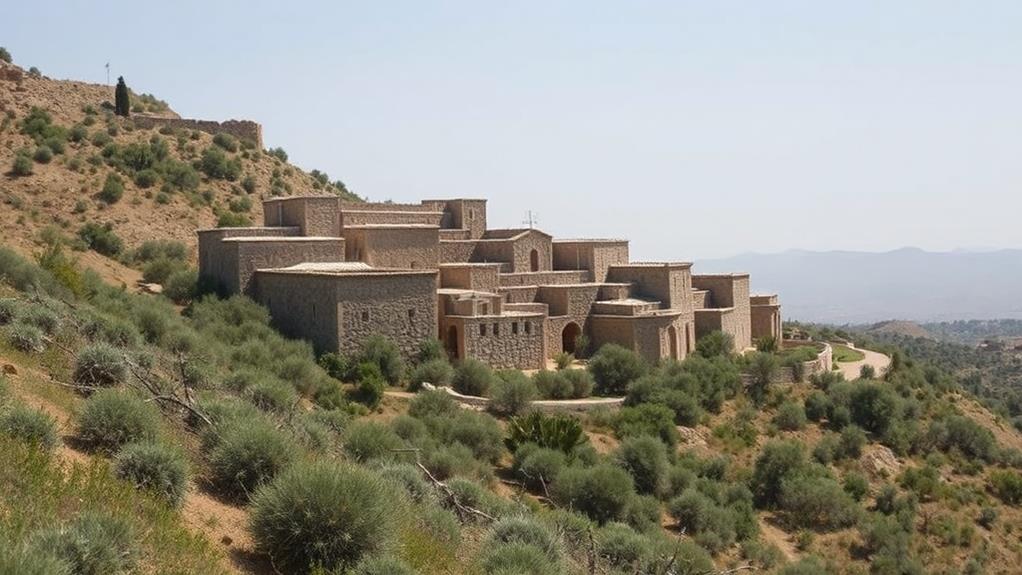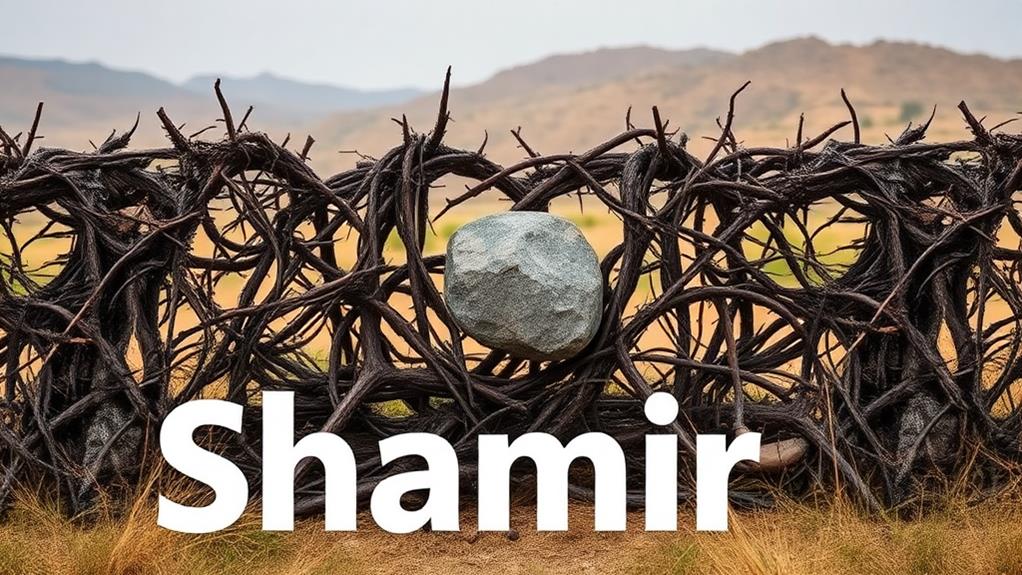Shamir Name Meaning in the Bible
The term “Shamir” in the Bible originates from the Hebrew word שׁמיר (shamir), symbolizing resilience and protection, and is associated with both a thorny plant and a hard, precious stone. Derived from the root *shmr* III, which relates to guarding or keeping, Shamir represents sharpness, hardness, and divine intervention. In biblical contexts, it is linked to various locations and holds symbolic interpretations, while in the Talmud, it is mythically portrayed as a legendary worm or stone created on the Sabbath eve that could cut any stone. Exploring the rich history and symbolism of Shamir reveals a profound spiritual legacy.
Key Takeaways
- The name Shamir in the Bible is derived from the Hebrew root *shmr* III, meaning to guard or keep, symbolizing protection and resilience.
- Shamir can refer to a thorny plant, emphasizing sharpness and hardness, with biblical references in Jeremiah 17:1, Ezekiel 3:9, and Zechariah 7:12.
- The name Shamir is associated with strength and vigilance, representing a substance harder than any stone, akin to adamant or diamond.
- In biblical contexts, Shamir also denotes neglected landscapes, highlighting divine intervention and transformation.
- The spiritual significance of Shamir in the Bible underscores guarding, protection, and divine power, as seen in its legendary use by King Solomon in the Temple’s construction.
Biblical Origins of Shamir

The term “Shamir” in the biblical context originates from the Hebrew word שָׁמִיר, which exhibits two distinct meanings. Primarily, it refers to a species of thorny plant or thistle, symbolizing resilience and protection in the natural world. This aspect of Shamir is metaphorically employed to describe overgrown or neglected landscapes, emphasizing the need for care and cultivation. Additionally, it aligns with themes of strength and leadership, similar to the name Robert, which embodies spiritual qualities of courage and divine protection symbolizes strength, courage, and righteousness.
Additionally, the term is also used to denote a hard, precious stone capable of breaking through other materials, including steel. This represents Shamir’s spiritual roots in the context of divine strength and power. For example, in biblical literature, it is mentioned as a tool used by Solomon to build the First Temple without the use of iron tools, underscoring the supernatural capabilities attributed to Shamir.
Understanding the dual meanings of Shamir provides insight into its rich symbolism and spiritual significance in the biblical narrative. Its association with both natural resilience and supernatural power underscores its importance as a symbol of divine protection and strength, contributing to its enduring significance in religious texts and traditions.
Etymology and Hebrew Roots
Beneath the surface of the term “Shamir” lies a complex etymological history rooted in Hebrew. The word *shamir* possesses dual meanings in the Tanach: it refers to a type of thorny plant or thistle in the book of Yeshayahu, and to a hard precious stone, akin to a diamond or emery, in other prophetic books such as Yirmiyahu, Yechezkel, and Zechariah. This duality can be seen as symbolic of the themes of resilience and strength, much like the qualities embodied by names such as Charlotte, which symbolize freedom and strength.
Its Hebrew significance is deeply intertwined with its use in the Bible. The noun *shamir* can be traced back to the root *shmr* III, which also encompasses meanings related to guarding or keeping. This etymological background underscores the idea that a *shamir* could symbolize something that protects or guards, much like a thorn or a sharp stone.
Biblical connections highlight the versatility of the term “Shamir,” which is not only a name but also a concept with profound symbolic implications. In Jewish tradition, *shamir* is often associated with the legend of a small worm or stone capable of cutting through hard materials, featured prominently in stories of Moses and Solomon.
This multifaceted nature of “Shamir” enriches its Hebrew roots, offering a nuanced understanding of its importance in both biblical and cultural contexts.
Symbolic Interpretations of Shamir

Symbolic explanations of Shamir are rich and varied, reflecting the multifaceted nature of this Hebrew term. In biblical contexts, Shamir symbolizes sharpness and hardness, as seen in Jeremiah 17:1 and Ezekiel 3:9, where it is compared to a pen point made of a hard substance or likened to adamant or diamond. This connotation of strength and resilience is essential in understanding its symbolic importance.
Esoteric interpretations explore deeper into the mystical meanings of Shamir. In the Talmud, it is described as a supernatural organism capable of cutting through stone, used in the construction of the Temple by King Solomon. This mythical portrayal underscores the concept of divine intervention and supernatural forces in biblical narratives.
Furthermore, the creation of Shamir on the Sabbath eve of the Six Days of Creation, as mentioned in the Talmud, adds a layer of divine significance. Its ability to pierce hard surfaces without physical exertion is seen as a metaphor for spiritual and mystical powers that transcend natural laws. Through these symbolic and esoteric interpretations, Shamir becomes a potent symbol in biblical symbolism, conveying hidden messages and deeper meanings that have captivated scholars and theologians for centuries.
Historical Figures With the Name
Concrete examples of historical figures bearing the name Shamir can be found in both biblical and modern contexts. One of the most notable modern figures with this name is Yitzhak Shamir, a prominent Israeli politician and former Prime Minister of Israel. His life’s work was deeply intertwined with the establishment of Israel and its subsequent political landscape. The name Shamir carries significant meaning, as it is often associated with qualities such as humility and resilience that reflect its biblical roots.
- Yitzhak Shamir: Known for his role as the seventh Prime Minister of Israel, serving two terms from 1983 to 1984 and from 1986 to 1992. He was a leader of the Lehi, a Zionist militant group, and later became a key figure in the Likud party.
- Symbolic Significance: Shamir, the name, is also associated with strength and resilience, as evidenced by its interpretation in modern use. Yitzhak Shamir reflected on the name, stating it means “a thorn that stabs and a rock that can cut steel”.
- Legacy: Shamir’s commitment to the settlement of the Land of Israel as a central tenet of Zionism left a lasting impact on Israeli politics and foreign policy.
Geographical References in the Bible

Exploring geographical references in the Bible reveals that the name Shamir is associated with various locations, underscoring the multifaceted nature of this term. The term Shamir appears in different contexts, pointing to its geographical significance and diverse applications. In addition to its geographical references, the name Shamir can also symbolize divine guidance and transformation, echoing the spiritual significance of names like Aiden, which represent the light of God’s presence divine presence and guidance.
In the biblical narrative, Shamir is identified as the residence of Tola, one of the judges, situated in the hill country of Ephraim (Judges 10:1, 2). Another reference places Shamir among the cities of Judah in the hill country (Joshua 15:48). These geographical references highlight the importance of Shamir in the biblical landscape, showcasing its connection to various regions and tribal territories.
The specific location of Shamir is a subject of scholarly debate, with some suggesting it could be Khirbet Somerah, a site with ancient walls and cisterns, or even Sanur, a fortified town in the region of Nablus to Jenin. These locations underscore the historical and geographical contexts in which Shamir was mentioned, making it a significant element in the biblical geography.
The varied references to Shamir demonstrate its integral role in the biblical narrative, revealing its geographical significance and cultural impact.
Spiritual Significance and Legacy**
The name Shamir in the Bible holds profound symbolic and spiritual significance, derived from its Hebrew etymology related to guarding or protection, and its association with a hard, precious stone capable of cutting through any material. This dual meaning underscores the name’s connection to strength, resilience, and the divine power that transcends human limitations.
The legendary use of the shamir in the construction of the Temple by Solomon, as described in various Jewish traditions and legends, further emphasizes its spiritual legacy and its role in expressing divine wisdom and creativity.
Biblical Origins and Meaning
While the term Shamir has multiple references in the Bible, its spiritual significance primarily centers around its association with a hard, stone-like substance capable of engraving the hardest materials. This concept is pivotal to understanding the biblical origins and meaning of the name Shamir.
- The linguistic connections of Shamir are rooted in the Hebrew word meaning “thorn” or “a hard precious stone capable of breaking steel,” which is derived from the verb שמר (shamar, meaning to keep or guard.
- The cultural context of Shamir is intertwined with ancient legends, including its role in engraving the names of the twelve tribes on the breastplate of the high priest and its use in building the Temple without iron tools, underscoring its miraculous properties.
- Key Interpretations:
- Physical Property: Associated with adamant, a substance harder than any stone, making it a tool for engraving the hardest materials.
- Legends: Used by Moses to engrave names on the high priest’s breastplate and by Solomon to build the Temple without iron tools.
- Traditional Views: Varied interpretations include being a small worm or a powder of corundum, with different textual bases and historical origins.
Symbolic and Spiritual Impact**
Given its multifaceted origins and interpretations, the name Shamir carries profound symbolic and spiritual implications.
In biblical contexts, Shamir references a sharp thorn or a hard stone, akin to adamant or diamond, highlighting themes of resilience and strength. This duality in meaning underscores the complexity of spiritual symbolism within biblical narratives.
The name Shamir is not merely a geographical or personal designation but a conduit for deeper biblical interpretation. It embodies the protective and guarding qualities inferred from the Hebrew verb “shamar,” meaning to keep or guard, emphasizing vigilance and protection in its spiritual symbolism.
The legendary tales surrounding Shamir’s use in the construction of the First Temple, where it is said to have been used by Solomon to cut through stone without iron tools, further illustrate its symbolic importance in Jewish tradition.
Consequently, the name Shamir encapsulates a rich spiritual legacy that fosters reflection on strength, protection, and divine intervention. It serves as a reminder of the enduring power of faith and the profound symbolic depth of biblical narratives.
Names Symbolizing Purity and Virtue
- Trinity Name Meaning in the Bible
- Aaron Name Meaning in the Bible
- Azaria Name Meaning in the Bible
- Azariah Name Meaning in the Bible
- Shamir Name Meaning in the Bible
Frequently Asked Questions
What Is the Popularity Ranking of Shamir as a Baby Name in the US?
Shamir, a Hebrew-origin name meaning “flint,” holds significant cultural and historical value. In modern times, it ranks #4697 in U.S. births (2023), down 632 places from 2022, indicating a low but distinctive name popularity profile.
How Is Shamir Used in Post-Biblical Legends and Jewish Literature?
Revealing the enigmatic Shamir, a ‘diamond in the rough’ of Jewish folklore, we discover a mystical worm or stone that embodies Jewish symbolism, capable of cleaving stone without metal tools, weaving a tale of divine ingenuity and freedom from conventional constraints.
Is Shamir Considered a Variant for the Name of a Specific Herb in Modern Hebrew?
In modern Hebrew, “shamir” is mistakenly used to refer to the herb dill, due to an etymology debate and a botanical connection with fennel, as both are umbelliferous plants with similar appearances and uses.
Does the Name Shamir Have Different Meanings Depending on Its Biblical Context?
Much like a two-edged sword, the name Shamir reveals its versatility in the Bible, manifesting as both a thorny wild plant and a hard precious stone. This duality reflects the rich linguistic origins of Hebrew words, imbuing them with complex cultural significance.
Can Shamir Be Interpreted as Both a Physical Tool and a Mythical Creature?
Yes, the term “shamir” can be interpreted as both a physical tool, denoting a hard stone or stylus used in biblical contexts, and a mythical creature in folklore, symbolizing a magical entity capable of cutting through stone.
Conclusion
Shamir, rooted in Hebrew etymology, evokes images of thorns and hard stones, symbolizing resilience and strength. Its biblical references span geographical locations and personal narratives, while its symbolic interpretations have inspired historical figures and legendary tales, embedding Shamir as a lasting emblem of fortitude and endurance in spiritual and cultural legacies.






